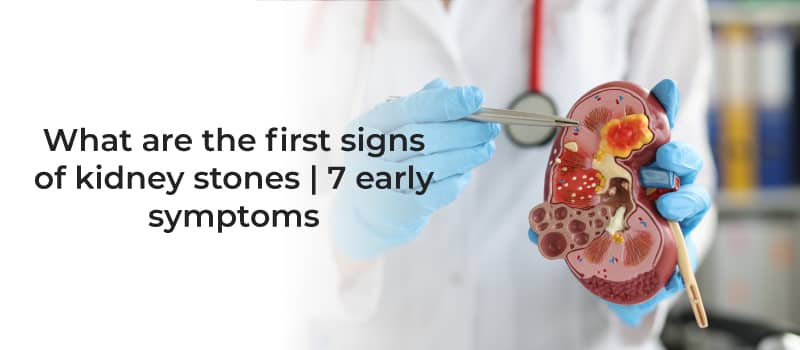What are the first signs of kidney stones | 7 early symptoms
Asian Institute of Nephrology and Urology | December 29, 2022

Table Of Contents
Introduction
The pain and discomfort that kidney stones bring with them are often referred to as excruciating. Kidney stones are very common, affecting around 12% of the Indian population.
While it is not life-threatening by itself, the pain can be unbearable, and when left untreated, it can cause severe damage. Learning about the first symptoms of kidney stones can keep you on guard so that you seek treatment before the pain worsens. This article is dedicated to helping you identify them. Read on.
What are kidney stones?
Kidney stones are nothing but mineral and salt collections. They are hard and may contain calcium and uric acid. While some of them are very small, the other can be a few inches big (when measured across). There also have been instances of kidney stones being as large as the kidney itself!
The amount of pain and the complexity of treatment depends on the size of the stones. Early treatment prevents growth and makes the process easy.
What causes kidney stones?
High mineral content in the urine leads to the formation of kidney stones. Hydration is the key to avoiding this problem because when water intake is low, the urine is more concentrated and has more minerals. Certain minerals directly lead to the formation of kidney stones, which may spread to the rest of the urinary tract as well.
Risks factors associated with kidney stones
Kidney stones are very common, and anyone can develop them. However, the chances of you developing them are higher if you meet any of the following criteria:
- You don't drink enough water
- You have diabetes
- You are obese or overweight
- You are taking diuretics or calcium-based medicines
- You eat a lot of red meat
- You have had a gastrointestinal surgery
- You had kidney stones before, and/or someone in your family has had them
- You eat a very high-protein diet with more sugar and salt
- Fever: Fever indicates that there’s an infection. It may point to an underlying infection (along with kidney stones) that needs immediate attention. Fever is often accompanied by chills
Conclusion
Kidney stones cannot and should not be taken lightly. The intense pain can be debilitating, leading to severe consequences if not treated on time. We advise you to make an appointment with the doctor if you experience any of the early signs of kidney stones. It's always better to be safe than in pain!
At AINU, we have the best kidney specialist in vizag who provides the world-class treatment with the advanced technology to prescribe the most efficient and hassle-free treatment for kidney stones. Please visit our website for more details.







